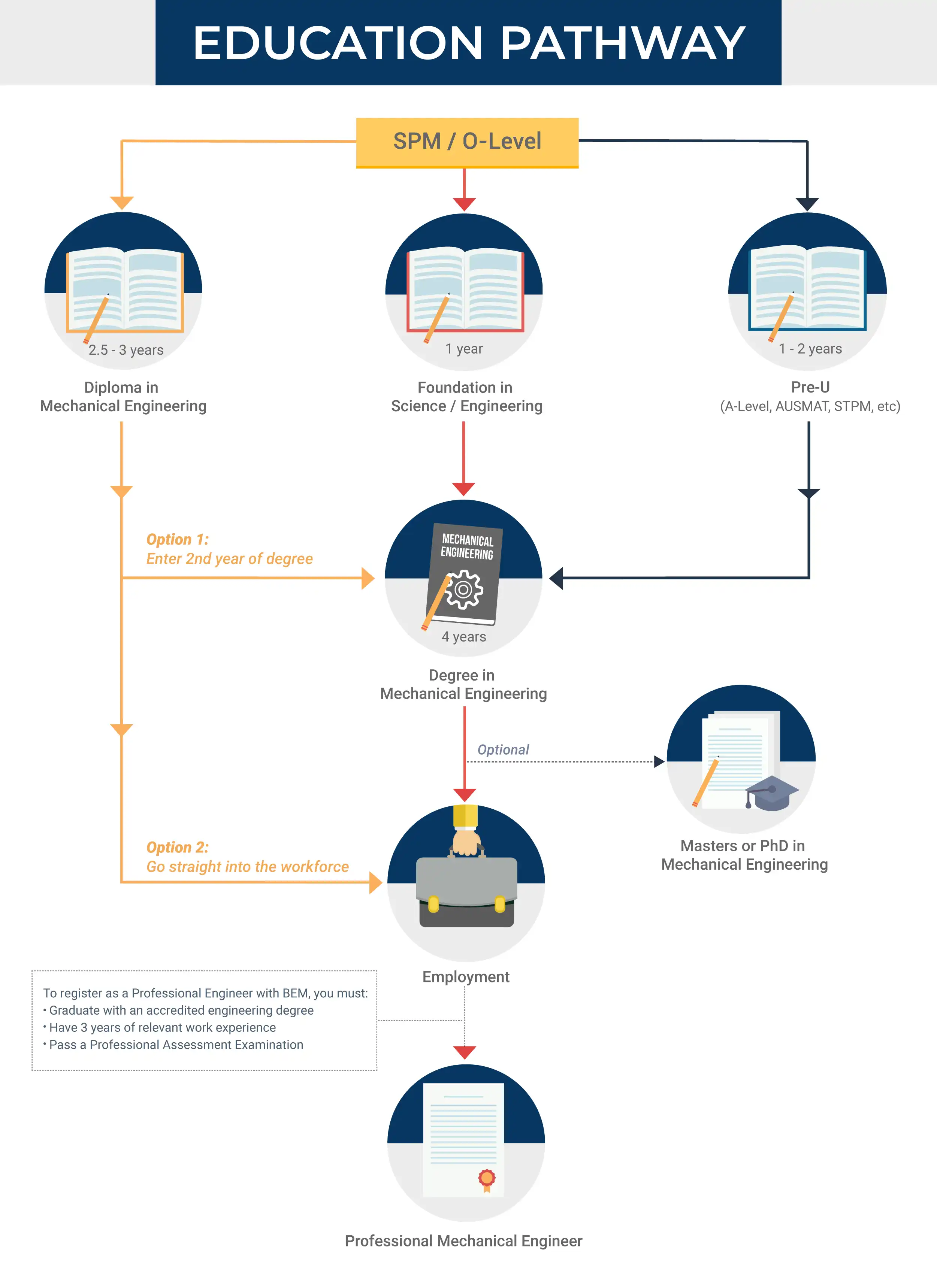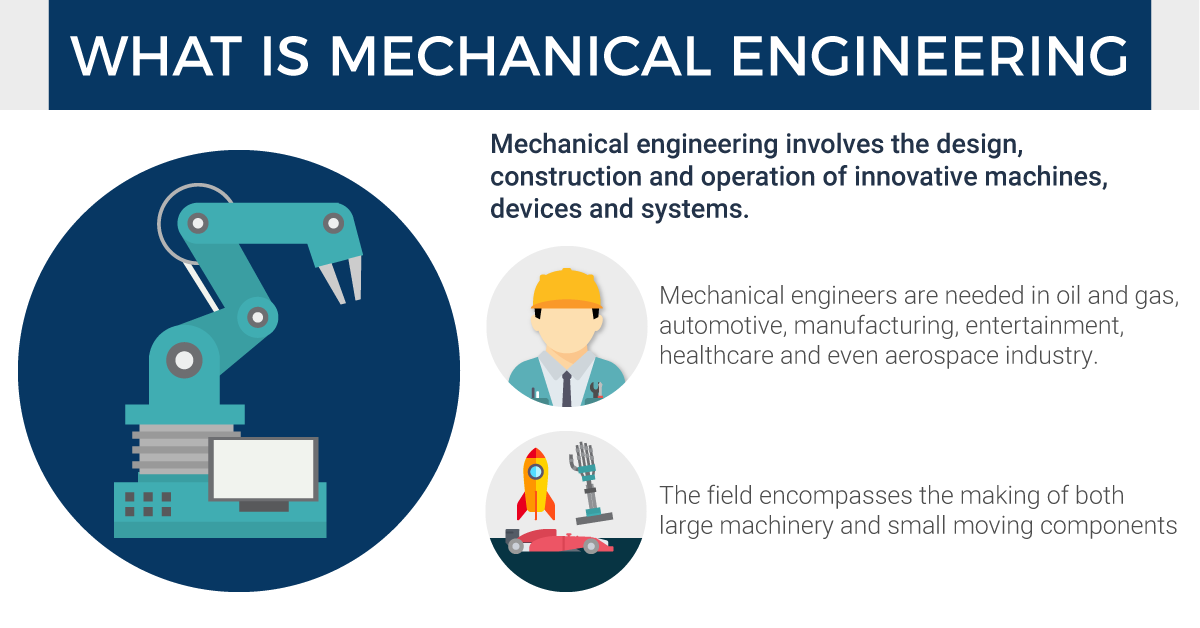The Complete Guide to Studying Mechanical Engineering in Malaysia
What do you learn in a mechanical engineering course? Explore the programme, its entry requirements and more in this guide to mechanical engineering courses in Malaysia.

From the clock that ticks away on your wall to your car tyres that spin smoothly on their axle, almost everything you use that moves was built with the help of a mechanical engineer. So if you’ve always been a curious cat and are constantly taking things apart to figure out how everyday items work, a career in mechanical engineering may be your calling!
Our comprehensive guide to mechanical engineering explores all you need to know about studying mechanical engineering in Malaysia.

University of Nottingham Malaysia
Mechanical Engineering MEng (Hons)
✓Accredited by the Board of Engineers Malaysia (BEM), Engineering Accreditation Council (EAC) Malaysia, UK’s Institution of Mechanical Engineers (IMechE) and UK’s Institution of Engineering Designers (IED)
#1. The Basics of Mechanical Engineering
 a) What is Mechanical Engineering
a) What is Mechanical Engineering
Mechanical engineering involves the design, construction and operation of innovative machines, devices and systems using the principles of physics, engineering, mathematics and material science.
As one of the oldest and broadest areas of engineering, it is needed in almost all industries including manufacturing, oil and gas, automotive, entertainment, healthcare and even aerospace. The field encompasses the making of both large machinery and small moving components; think sensors, lasers used for surgeries, vehicles, aircraft engines and machines for product or food manufacturing.
Ever wondered how thousands of your favourite Cadbury chocolate delights are wrapped in just a few minutes? You guessed right — using special food packaging machines that were designed and built by mechanical engineers.

#2. Studying a Mechanical Engineering Degree
a) Entry Requirements & Qualifications
To take a course in Mechanical Engineering, you are required to meet the entry requirements set by colleges or universities.
(i) Diploma in Mechanical Engineering
If you are planning to pursue a Diploma in Mechanical Engineering, these are the general entry requirements that you are required to meet:
- SPM / O-Level: Minimum 3Cs, including Mathematics and 1 other Science / Technical / Vocational subject, as well as a pass in English
A Diploma in Mechanical Engineering typically takes about 2.5 - 3 years to complete.
Upon completion, you can choose to join the working world, or further your studies to a Degree in Mechanical Engineering (entering from the second year onwards).
(ii) Degree in Mechanical Engineering
To pursue a Degree in Engineering, you need to complete a pre-university programme and meet the entry requirements.
The requirements needed to pursue a Mechanical Engineering Degree are:
- A-Level: Minimum 2Ds including Mathematics and Physics
- STPM: Minimum 2Cs including Mathematics and Physics
- Foundation in Science or Foundation in Engineering: Minimum CGPA of 2.00
- Diploma: Minimum CGPA of 2.00
In addition to the above requirements, it’s best to have at least a C in Mathematics and 1 other Science / Technical / Vocational subject as well as a pass in English at SPM level.
A Degree in Mechanical Engineering is usually 4 years long.
b) How Does Your Education Pathway Look Like?

Step #1: Undertake a foundation, pre-university or diploma
To start your journey, you'll need to enrol in a foundation or pre-university course. Choices available include A Level, Australian Matriculation, STPM or Foundation in either Engineering or Science. Typically, these courses span 1 – 2 years.
Alternatively, a Diploma in Mechanical Engineering is another route you can consider, usually lasting between 2.5 to 3 years. Opting for this pathway enables you to either join the workforce directly or progress to the second year of a degree programme.
Step #2: Earn a 4-year accredited Degree in Mechanical Engineering
Next, you'll need to enrol in a Mechanical Engineering Degree, which requires 4 years of study.
Do ensure that your degree is accredited by the Engineering Accreditation Council (EAC) of the Board of Engineers Malaysia (BEM). If your degree is from abroad, it must be from a country that is part of the Washington Accord.
Step #3: Register as a Graduate Engineer and acquire practical experience
Upon earning your accredited 4-year Degree in Mechanical Engineering, you can apply to BEM for registration as a Graduate Engineer.
Subsequently, you can begin your pursuit of achieving professional engineer status. This demands a minimum of 3 years of practical experience and passing the BEM’s Professional Assessment Examination (PAE).
Step #4: Achieve Professional Engineer status
Fulfilling the necessary criteria of relevant work experience and passing the Professional Assessment Examination allows you to apply for registration as a professional engineer with BEM.
As a registered professional engineer, you earn the privilege of prefixing “Ir.” or appending “P.Eng.” to your name, indicating your professional status.
In essence, it takes about 5 – 6 years to become an engineer from SPM, while attaining registered professional engineer status approximately spans 8 – 9 years.
c) What Will You Study in Mechanical Engineering?
Mechanical Engineering will equip you with a wide range of knowledge and skills. You will learn how to use your knowledge of mathematics, physics and other engineering fundamentals to design, manufacture, run and maintain mechanical equipment, machinery and tools.
Here are some of the subjects you may study as part of your Mechanical Engineering Degree:
- Engineering Mathematics
- Thermodynamics
- Fluid Mechanics
- Material Science and Engineering
- Fundamentals of Electronics
- Computer Aided Engineering
- Control and Instrumentation
d) How Much Does It Cost To Study Mechanical Engineering in Malaysia?
A Diploma in Mechanical Engineering can cost from RM20,000 – RM38,000. Meanwhile, the estimated cost to pursue a Degree in Mechanical Engineering is between RM37,000 – RM358,000.
#3. Why Should You Study Mechanical Engineering?
 Mechanical engineers are key to the development of society thanks to all the cool inventions they make possible. Here are some reasons why you should consider taking up mechanical engineering.
Mechanical engineers are key to the development of society thanks to all the cool inventions they make possible. Here are some reasons why you should consider taking up mechanical engineering.
(a) You are curious about how things work
You have a burning desire to discover how things work and you often find yourself taking things apart and reassembling them to learn how they tick.
(b) You are good at Maths and Science
Designing and assembling complex systems and machinery requires the knowledge of advanced math and physics to ensure precision and accuracy. So if you’re a whiz at these subjects, you should consider mechanical engineering as a career.
(c) You want to see the world evolve
Humans are lazy productive creatures who are always looking for things to ease their everyday lives and you want to continuously improve it with advances in technology. From creating robots to assist in complicated surgeries to creating submarines that will allow people to explore undiscovered parts of the ocean, you want to create things that’ll help the masses.

#4. What Skills Do You Need for a Mechanical Engineering Course?
 Here are some of the key skills and qualities you need to develop to do well in a Mechanical Engineering programme.
Here are some of the key skills and qualities you need to develop to do well in a Mechanical Engineering programme.
(a) Ability to solve complex problems
Engineering requires you to be able to think critically and creatively so that you can solve issues that arise during the design, manufacturing and operation stages of product development. For example, if you’re working at a glass packaging company and the wrapping machine constantly breaks down, it’s your job to figure out how to fix it.
(b) Computer skills
To create precise designs, you will need to be proficient in a range of computer software including AutoCAD and SolidWorks. As such, you will need to stay updated on the latest technology in the industry.
(c) Effective oral and written communication
As mechanical engineers often work in a team, this means you will need to be able to communicate effectively with team members. A small miscommunication on how to assemble parts can lead to unfavourable results, so it’s important to articulate your vision clearly and thoroughly.

University of Nottingham Malaysia
Mechanical Engineering MEng (Hons)
✓Accredited by the Board of Engineers Malaysia (BEM), Engineering Accreditation Council (EAC) Malaysia, UK’s Institution of Mechanical Engineers (IMechE) and UK’s Institution of Engineering Designers (IED)
#5. What Career Options Do You Have with a Mechanical Engineering Degree?
Mechanical Engineering graduates can seek employment opportunities from a wide range of industries from automotive and energy to research and consultancy.
Here are some Mechanical Engineering-related careers that you can seek upon graduating:
- Mechanical engineer
- Manufacturing engineer
- Automotive engineer
- Aircraft engineer
- Design engineer
- Robotics engineer
#6. Where Can You Study Mechanical Engineering in Malaysia?
If Mechanical Engineering is right up your alley, then check out some of the best universities to study Mechanical Engineering in Malaysia.
University of Nottingham Malaysia
Semenyih, Selangor
Mechanical Engineering MEng (Hons)
Intake
Sep
Tuition Fees
RM226,000
Get RM300 Rebate when you enrol through EduAdvisor! T&C apply.
 a) What is Mechanical Engineering
a) What is Mechanical Engineering









